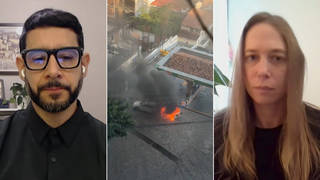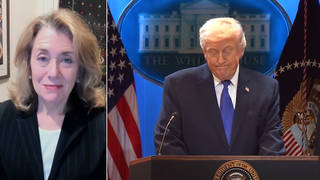
Guests
- Robert Jay Liftonrenowned American psychiatrist and author who died September 4, 2025.
The celebrated psychiatrist and author Robert Jay Lifton has died at the age of 99. His studies on the effects of nuclear war, terrorism and genocide, including the books Death in Life: Survivors of Hiroshima and The Nazi Doctors: Medical Killing and the Psychology of Genocide, shaped psychological understandings of the effects of mass violence. He appeared on Democracy Now! several times, including in 2017 to discuss Trump during his first term. “With Trump, of course, malignant normality becomes the rule,” says Lifton, “because he’s president, and what a president does tends to normalize potentially bad, evil or destructive behavior.”
Transcript
AMY GOODMAN: This is Democracy Now!, democracynow.org. I’m Amy Goodman.
We end today’s show remembering the acclaimed psychiatrist and author, Dr. Robert Jay Lifton. He died Thursday at the age of 99. He wrote more than 20 books about the psychological ramifications of nuclear war, terrorism, genocide, as well as the death penalty. In his New York Times obituary, psychiatrist Anthony Storr quoted — he’s quoted describing Dr. Lifton as fascinated by “the reaction of human beings to extreme situations.”
In 1967, Dr. Robert Jay Lifton won a National Book Award for his book Death in Life: Survivors of Hiroshima, about the 90,000 survivors of the first atomic bomb dropped on a population. In 1986, he published the seminal book The Nazi Doctors: Medical Killing and the Psychology of Genocide.
He appeared on Democracy Now! several times, including in 2017 after he published the book The Climate Swerve: Reflections on Mind, Hope, and Survival. It was nine months into President Trump’s first term. Some of his closest aides and advisers were saying Trump was unstable and unraveling and that the White House was increasingly consumed by chaos. Trump was also slated to announce the U.S. would decertify the landmark 2015 Iran nuclear deal. I interviewed him along with Democracy Now!’s Nermeen Shaikh.
NERMEEN SHAIKH: Is it your sense that there are sufficient restraints on Donald Trump acting unilaterally on either of these fronts, climate or nuclear?
ROBERT JAY LIFTON: Of course there are not. You would have to have total restraints for them to be sufficient with a man like Donald Trump. Of course there aren’t sufficient restraints. And who ever depended upon generals to restrain a civilian in so many different areas? And we don’t know the outcome.
I’m not, in my book or in my work, promising that we’ve accomplished enough to prevent climate damage and real disaster from happening. It’s happening already. What I’m saying is that there has been a shift in mindset that makes possible the actions, the sensible actions, necessary to curb global warming. We still haven’t taken those actions fully.
And, you know, at the beginning of my book, I speak of the ultimate absurdity, the ultimate absurdity that if we do nothing but what we’re doing now — and it’s what I mean by malignant normality — just go on using fossil fuels, we will do ourselves in as a civilization, pretty much by the end of this century. Nothing could be more absurd than that. But at least we have a beginning shift in mindset that allows us to take reasonable action. And that’s what Paris was all about.
AMY GOODMAN: I wanted to ask you about the quote you begin your book with. You quote the American poet Theodore Roethke, saying, “In a dark time, the eye begins to see.”
ROBERT JAY LIFTON: Yes, that’s a beautiful line from a very great poet. I’ve used that throughout my career, because it’s, in a way, what my work is about. I’ve studied a lot of descents into darkness: Hiroshima, the Vietnam War, Nazi doctors, and others, Aum Shinrikyo in Japan. And I always feel there’s something to be learned from what happened. And it doesn’t mean that we’re guaranteed to make good use of our history and never do it again. It does mean that some kind of knowledge can come from it. And I see myself, in that way, as what I call a witnessing professional, trying to use my professional knowledge to bear witness to and, in some way, reveal more about this kind of darkness.
AMY GOODMAN: Can you talk more about the Nazi doctors? I mean, you devote a chapter to them here. But, I mean, your work spans — well, you are 91 years old now.
ROBERT JAY LIFTON: Yes.
AMY GOODMAN: You have so much wisdom, in both experience and all you have brought to this. Tell us what we should learn from what you learned from these men.
ROBERT JAY LIFTON: With the Nazi doctors, when a German doctor who would be a member of the Nazi Party was assigned to Auschwitz, he was expected to do so-called selections and send most arriving Jews to the gas chamber. That was considered normal behavior for a doctor in Auschwitz. Some of them had difficulty with it, but, ultimately, they adapted to it. This is rendering professionals a hired gun for a malignant version of normality. And I learned that, in extreme ways, professionals can be put to use for killing rather than healing. That’s what happened in Nazi Germany. But we also saw expressions of that, not quite as fully expressed, but with American psychologists, and for a while, psychiatrists, engaging in torture, and that being an expected norm, normal behavior, for —
AMY GOODMAN: You’re talking about the American Psychological Association —
ROBERT JAY LIFTON: Yeah, I’m talking about —
AMY GOODMAN: — cooperating with President Bush.
ROBERT JAY LIFTON: That’s right. And I’m talking about both individual psychologists and psychiatrists, and then the American Psychological Association, collaborating with the torturers. I call that a scandal within a scandal. It’s a scandal that professionals are doing that, but it really shows that we have to, as professionals or as anything, recognize what our work is being used for and where it’s being put in connection with despotic behavior. The scandal within a scandal is an association, that’s supposed to watch over the ethics of a profession, joins in torture or at least protects those who join in torture.
But all that was exposed by a movement from within psychologists, from within the American Psychological Association, with the help of reasonably good leadership on the part of the American Psychiatric Association, who said it was wrong for any psychiatrist to be in the room during an interrogation that could spill over into torture.
Yes, those were examples of malignant normality, not in Nazi Germany, but in relation to democratic United States of America. And with Trump, of course, malignant normality becomes the rule, because he’s president, and what a president does tends to normalize potentially bad, evil or destructive behavior.
AMY GOODMAN: Acclaimed psychiatrist and author Robert Jay Lifton, speaking in our Democracy Now! studio in 2017, in one of his many interviews on the show. You can go to democracynow.org to see them all. Robert Jay Lifton died at his home in Cape Cod at the age of 99, survived by his partner, Nancy Rosenblum; his son, Kenneth Lifton; and four grandchildren.
That does it for our show. I’m Amy Goodman. Thanks so much for joining us.












Media Options